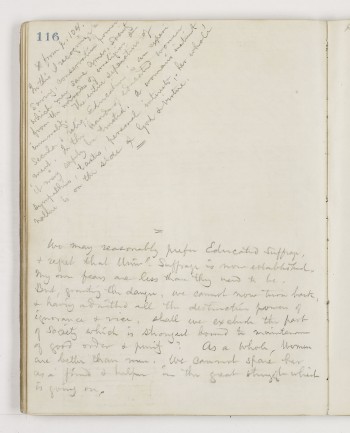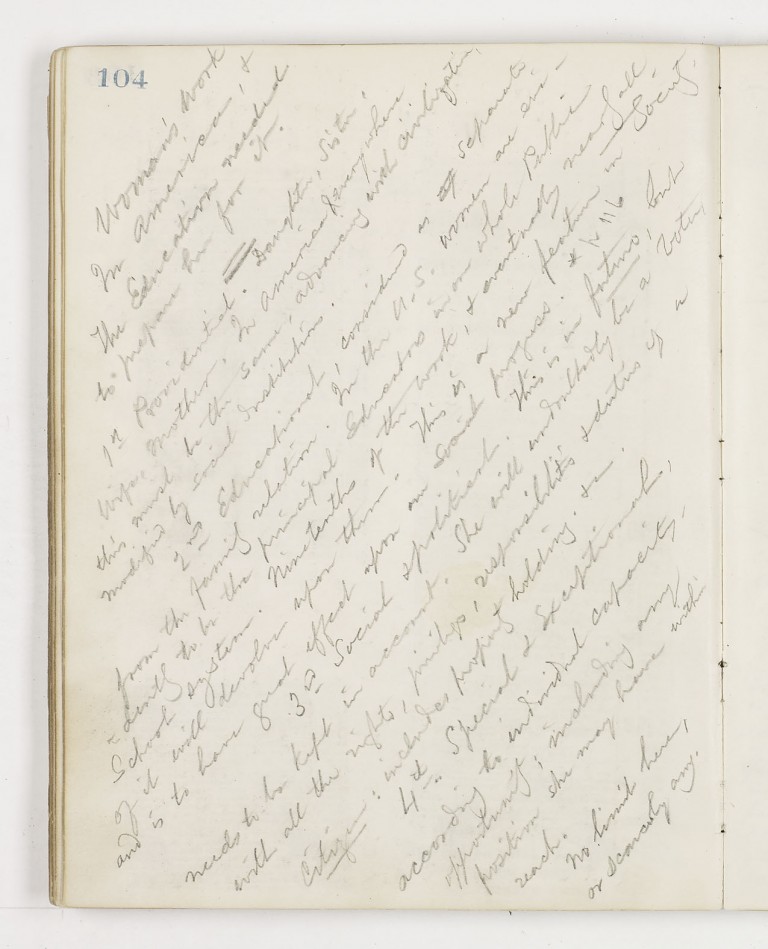
Women’s Education: From the Desk of William Greenleaf Eliot
In December of 1870, William Greenleaf Eliot penned the following thoughts in his journal, which he jotted down after writing a speech on women’s education at the Missouri State Teachers’ Conference. He wrote,
“We cannot now turn back, and having now admitted all the destructive powers of ignorance and vice, shall we exclude the part of society which is strongest bound to maintenance of good order and purity?”
William Greenleaf Eliot Personal Papers, Series 01, Notebook 7, page 116.

To Eliot, women were an underrepresented group of American citizens, and in order to raise their station in life, as well as win their right to vote, they needed an education.
Eliot’s views on women’s education could be considered radical for his day. In his speech written for the Teachers’ Conference entitled, “Women’s Work in America, and the Education Needed to Prepare Them for It,” Eliot explicitly connected work, education, and democratic participation, three things guaranteed to all citizens, including women. Therein, he argued, “According to individual capacity, opportunity; including any position she may have within reach. No limit here, or scarcely any.” Eliot’s newfound radical attitude represents a break from his previous thoughts on societal change, in which he believed that change should come gradually and cautiously so as not to disrupt the social order.
Furthermore, the above views reflect distinct transformations in administrative policies at Washington University. By 1870, Eliot had come around to the idea of admitting women. He had proposed the notion to the school’s board of directors previously, and by October of that year they unanimously agreed to enroll Alice Belcher, the first female undergraduate student, for the following year.
This same desire to include both sexes into higher education permeated his views on women’s suffrage, which he saw as inseparable from a properly functioning political order. Intellectually, Eliot could not support a political regime that denied democratic participation to one particular group of people. He wrote, “In a republic, an unrepresented class is the sure victim of injustice. The ballot box and equal representation is the only way to secure equality of rights.” His progressive views on women’s rights may have originated with his relationship to his daughters, whose education he oversaw. Each one enrolled at Mary Institute, an all-girl’s school affiliated with Washington University.

Women’s Work In America, & The Education needed to prepare her for it.
…1st Providential. Daughter, Sister, Wife, Mother. In America & everywhere this must be the same, advancing with civilization, modified by social Institutions. 2nd Educational, considered as an separate from the family relation. In the U.S. women are evidently to be the principle Educators in our whole Public School System. Nine tenths of the work, & eventually nearly all of it will devolve upon them. This is a new feature in Society and is to have great effect upon our Social progress. 3rd Social and political. This is in future, but needs to be kept in account. She will undoubtedly be a voter with all the rights, privileges, responsibilities, & duties of a citizen: includes property holding, too. 4th Special & Exceptional, according to individual capacity, opportunity; involving any position she may have within reach. No limit here, or scarcely any.
…In this I recognize a saving, conservative power which may save American Society from the inroads of irreligion & immorality. The entire separation of secular & religious Education is an experiment. In the hands of educated women it may safely be trusted. A woman’s instinct, sympathies, tastes, personal interests, her whole nature is on the side of God & Virtue. We may reasonably prefer Educational Suffrage, & regret that Universal Suffrage is more established. My own fears are less than they used to be. But, granting the danger, we cannot now turn back, & having admitted all the destructive powers of ignorance & vice, shall we exclude the part of society which is strongest bound to maintenance of good order & purity? As a whole, Women are better than men. We cannot spare her as a friend & helper in the great struggle which is going on.
William Greenleaf Eliot Personal Papers, Series 01, Notebook 7, page 104
Visit the University Archives’ online exhibit Celebrating Women for more information about women at Washington University in St. Louis.
To find out more about Eliot, please consult the William Greenleaf Eliot Personal Papers located at the Archives and this research guide.
You can read more of Eliot’s online collection by perusing his materials at Missouri Digital Heritage.
Sources
- Rev. Dr. Earl K. Holt III, William Greenleaf Eliot: Conservative Radical.